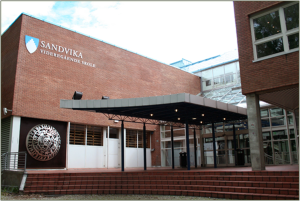 I recently finished a two-day workshop lead by Canadian school leader George Couros and hosted by my school (Sandvika High, near Oslo, Norway). I was not very pleased about the attendance. I spent some time after the workshop reflecting on events and thought it might be worthwhile to others to share some of my thoughts on the concept of “the networked leader” and the importance of assuming that role in the year 2014.
I recently finished a two-day workshop lead by Canadian school leader George Couros and hosted by my school (Sandvika High, near Oslo, Norway). I was not very pleased about the attendance. I spent some time after the workshop reflecting on events and thought it might be worthwhile to others to share some of my thoughts on the concept of “the networked leader” and the importance of assuming that role in the year 2014.
First of all, it is incredible that we were able to invite George over from Canada to do the workshop. He is an amazing leader in this area of connected school leadership, and he is a wonderful story teller. He has so many great examples of just what is going on in classrooms and schools where innovative leaders are encouraging teachers and students to connect with the world.
The knowledge that George had to share is exactly what we need in Norway (and most every other nation) to get going on this adventurous journey. Read his latest article about his warnings to administrators as they open Pandora’s box, for example
Given what George Couros had to offer us, I was very disappointing that so few school leaders took the time to join in the conversation. I realize I picked one of the busiest times in the school year, but the topic is so important. I was most surprised by the fact that eight leaders decided to drop the workshop after signing up for it, with only one or two days notice. (Perhaps a time management workshop is even more needed?)
Obviously, this topic was not a priority. Which calls to mind one of the main questions poised during the two-day workshop: What is the purpose of school? Whatever that purpose is, it should certainly be the main purpose of principals and department heads.
I realize there is no simple answer here, but surely the students factor into this. Their education – their daily experience as they spend most of their young lives IN school, is pretty important. And if you don’t think school leaders have anything to do with the classroom, you need to re-think your priorities.
Making school interesting and engaging for the students is – in my opinion – what our work is all about. And these days, creating interest and engagement requires leaders to stay on top of developments in the connected world. If you are not networked – learning and engaging in daily conversations with other school leaders – then in my opinion you are not doing your job.
It’s as Will Richardson says: If you are waiting for a workshop to learn how to use Twitter and other social media tools, then you don’t know how your students are learning today. They are not waiting for the adults at school to act. If they are curious, if they want to learn something new, they will learn from others online.
My goal for my school is to look to the Parkland School Division, where George is a division principal. Their mission and vision is as follows:
- The school is a place where exploration, creativity, and imagination make learning exciting and where all learners aspire to reach their dreams.
- Our purpose is to prepare, engage and inspire our students to be their best in a quickly changing global community.
It is all about relationships and learning
 The workshop began with that statement at the forefront. It is what I believe should be the fundamental value that guides everything we do. Building relationships, getting to know your students to be able to help and guide them in their learning.
The workshop began with that statement at the forefront. It is what I believe should be the fundamental value that guides everything we do. Building relationships, getting to know your students to be able to help and guide them in their learning.
There is no one size fits all in learning. I recently read the article by Steve Hargadon, “Escaping the Education Matrix,” in Mindshift . It fits nicely into what we worked on during our two days together. To drive real change, Hargadon says, focus on the human factors.
“Recognizing the different needs of every student, and the desire to help each one become personally competent as a learner and find productive things to do in life—that won’t happen online,” he reminds us.
Living in a democracy means involving people in decision making, Hargadon says. “You can’t just create a new system to implement top down; you have to provide the opportunity to talk about it and build it constructively.”
My takeaways from this workshop
My takeaways were actually many, but for now I think I will take some advice offered during the workshop and concentrate on a few areas at a time.
I have already used blogging in my class, but this week I got new ideas on how to use it with more students in a different way. In our school the students could have a school blog all three years and divide their subjects into categories. If we could get the middle schools to start this project that would be perfect. Transparency, cross curriculum work and sharing your learning with more teachers are just some of the benefits for both students and teachers.
 If I was to choose a couple of areas where I would like my school to move forward with, the first would be to have everyone sharing on Twitter. Starting slowly with a few tweets from workshops and seminars using our school hashtag, #sandvikavgs.
If I was to choose a couple of areas where I would like my school to move forward with, the first would be to have everyone sharing on Twitter. Starting slowly with a few tweets from workshops and seminars using our school hashtag, #sandvikavgs.
I would also love it if more teachers were using blogs to share ideas about what they do in the classroom, and by that encouraging more sharing in the classrooms and between classrooms. If we can do this, I would expect more innovative and exciting things to happen in our school because we are making the learning more transparent and engaging for the students and the teachers.
The Parkland Schools purposely call everyone a learner – students and teachers and leaders alike. And by viewing everyone in school as a learner first, you have taken a big step forward.
We choose to move forward and change our schools
The leaders who joined us for the workshop will continue to share our learning under the hashtag #osloleadership. By sharing in visible ways through social media, we are hoping more school leaders in Norway will participate. But we are passing up on huge opportunities to learn if we restrict our conversations to inside national borders. The language barrier might factor into this, but I do believe participants in non-English speaking countries will benefit by using English as their Twitter language.
I will close by quoting John F. Kennedy’s moon speech, slightly moderated to suit this purpose:
We choose to move forward and change our schools in this decade, not because it is easy, but because it is hard, because that goal will serve to organize and measure the best of our energies and skills, because that challenge is one that we are willing to accept, one we are unwilling to postpone, and one which we intend to win!
Ann Michaelsen’s use of technology to connect students in her English language class was featured last week in a BBC report.
Ann Michaelsen
Latest posts by Ann Michaelsen (see all)
- Connected Leadership & the Purpose of School - February 2, 2014
- English Learners & Public Blogging - December 4, 2012
- My third ISTE adventure in America! - July 6, 2012


Trackbacks/Pingbacks